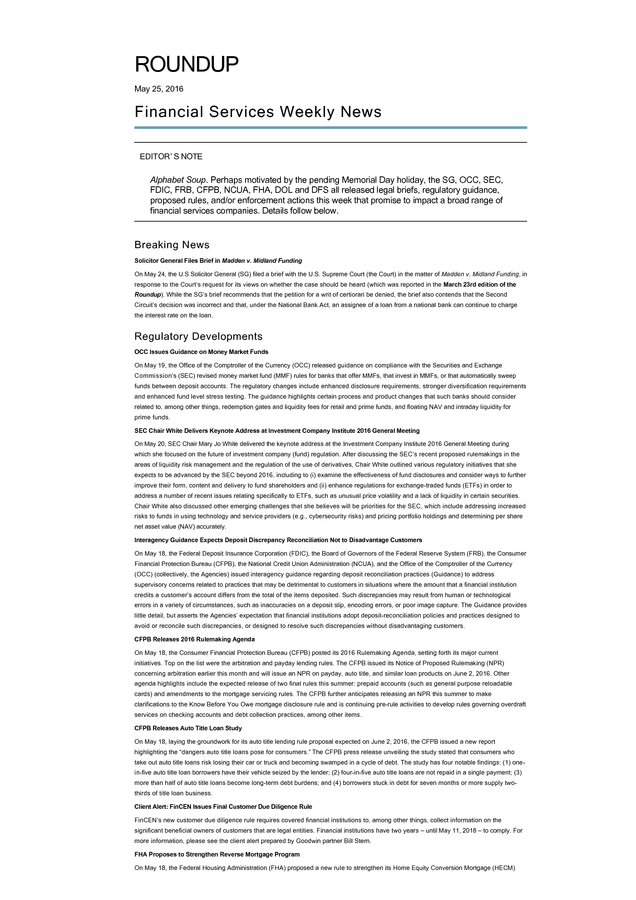Description
ROUNDUP
May 25, 2016
Financial Services Weekly News
EDITOR’ S NOTE
Alphabet Soup. Perhaps motivated by the pending Memorial Day holiday, the SG, OCC, SEC,
FDIC, FRB, CFPB, NCUA, FHA, DOL and DFS all released legal briefs, regulatory guidance,
proposed rules, and/or enforcement actions this week that promise to impact a broad range of
financial services companies. Details follow below.
Breaking News
Solicitor General Files Brief in Madden v. Midland Funding
On May 24, the U.S Solicitor General (SG) filed a brief with the U.S. Supreme Court (the Court) in the matter of Madden v. Midland Funding, in
response to the Court’s request for its views on whether the case should be heard (which was reported in the March 23rd edition of the
Roundup). While the SG’s brief recommends that the petition for a writ of certiorari be denied, the brief also contends that the Second
Circuit’s decision was incorrect and that, under the National Bank Act, an assignee of a loan from a national bank can continue to charge
the interest rate on the loan.
Regulatory Developments
OCC Issues Guidance on Money Market Funds
On May 19, the Office of the Comptroller of the Currency (OCC) released guidance on compliance with the Securities and Exchange
Commission’s (SEC) revised money market fund (MMF) rules for banks that offer MMFs, that invest in MMFs, or that automatically sweep
funds between deposit accounts. The regulatory changes include enhanced disclosure requirements, stronger diversification requirements
and enhanced fund level stress testing. The guidance highlights certain process and product changes that such banks should consider
related to, among other things, redemption gates and liquidity fees for retail and prime funds, and floating NAV and intraday liquidity for
prime funds.
SEC Chair White Delivers Keynote Address at Investment Company Institute 2016 General Meeting
On May 20, SEC Chair Mary Jo White delivered the keynote address at the Investment Company Institute 2016 General Meeting during
which she focused on the future of investment company (fund) regulation. After discussing the SEC’s recent proposed rulemakings in the
areas of liquidity risk management and the regulation of the use of derivatives, Chair White outlined various regulatory initiatives that she
expects to be advanced by the SEC beyond 2016, including to (i) examine the effectiveness of fund disclosures and consider ways to further
improve their form, content and delivery to fund shareholders and (ii) enhance regulations for exchangetraded funds (ETFs) in order to
address a number of recent issues relating specifically to ETFs, such as unusual price volatility and a lack of liquidity in certain securities.
Chair White also discussed other emerging challenges that she believes will be priorities for the SEC, which include addressing increased
risks to funds in using technology and service providers (e.g., cybersecurity risks) and pricing portfolio holdings and determining per share
net asset value (NAV) accurately.
Interagency Guidance Expects Deposit Discrepancy Reconciliation Not to Disadvantage Customers
On May 18, the Federal Deposit Insurance Corporation (FDIC), the Board of Governors of the Federal Reserve System (FRB), the Consumer
Financial Protection Bureau (CFPB), the National Credit Union Administration (NCUA), and the Office of the Comptroller of the Currency
(OCC) (collectively, the Agencies) issued interagency guidance regarding deposit reconciliation practices (Guidance) to address
supervisory concerns related to practices that may be detrimental to customers in situations where the amount that a financial institution
credits a customer’s account differs from the total of the items deposited. Such discrepancies may result from human or technological
errors in a variety of circumstances, such as inaccuracies on a deposit slip, encoding errors, or poor image capture. The Guidance provides
little detail, but asserts the Agencies’ expectation that financial institutions adopt depositreconciliation policies and practices designed to
avoid or reconcile such discrepancies, or designed to resolve such discrepancies without disadvantaging customers.
CFPB Releases 2016 Rulemaking Agenda
On May 18, the Consumer Financial Protection Bureau (CFPB) posted its 2016 Rulemaking Agenda, setting forth its major current
initiatives. Top on the list were the arbitration and payday lending rules. The CFPB issued its Notice of Proposed Rulemaking (NPR)
concerning arbitration earlier this month and will issue an NPR on payday, auto title, and similar loan products on June 2, 2016. Other
agenda highlights include the expected release of two final rules this summer: prepaid accounts (such as general purpose reloadable
cards) and amendments to the mortgage servicing rules. The CFPB further anticipates releasing an NPR this summer to make
clarifications to the Know Before You Owe mortgage disclosure rule and is continuing prerule activities to develop rules governing overdraft
services on checking accounts and debt collection practices, among other items.
CFPB Releases Auto Title Loan Study
On May 18, laying the groundwork for its auto title lending rule proposal expected on June 2, 2016, the CFPB issued a new report
highlighting the “dangers auto title loans pose for consumers.” The CFPB press release unveiling the study stated that consumers who
take out auto title loans risk losing their car or truck and becoming swamped in a cycle of debt. The study has four notable findings: (1) one
infive auto title loan borrowers have their vehicle seized by the lender; (2) fourinfive auto title loans are not repaid in a single payment; (3)
more than half of auto title loans become longterm debt burdens; and (4) borrowers stuck in debt for seven months or more supply two
thirds of title loan business.
Client Alert: FinCEN Issues Final Customer Due Diligence Rule
FinCEN’s new customer due diligence rule requires covered financial institutions to, among other things, collect information on the
significant beneficial owners of customers that are legal entities. Financial institutions have two years – until May 11, 2018 – to comply. For
more information, please see the client alert prepared by Goodwin partner Bill Stern.
FHA Proposes to Strengthen Reverse Mortgage Program
On May 18, the Federal Housing Administration (FHA) proposed a new rule to strengthen its Home Equity Conversion Mortgage (HECM)
. Program with the intent to make FHAinsured reverse mortgages remain a viable resource for senior homeowners. According to the FHA,
the new rule would complement the reforms implemented by the FHA over the past two years by adding new consumer protections that
would: (1) ensure that HECM counseling occurs before a mortgage contract is signed; (2) require lenders to fully disclose all HECM loan
features; (3) cap lifetime interest rates on HECM Adjustable Rate Mortgages (ARMs) at 5%; (4) reduce the cap on annual interest rate
increases on HECM ARMs from 2% to 1%; (5) require lenders to pay mortgage insurance premiums until the HECM is paid in full,
foreclosed on or a DeedinLieu (DIL) is executed; (6) include utility payments in the property charge assessment; and (7) create a “cash for
keys” program to encourage borrowers to complete a DIL to exit the property.
Client Alert: DOL Issues Final Rule More Than Doubling FLSA Minimum Salary Level Required for Overtime Exemptions
Based on a new rule issued by the Department of Labor, the minimum salary for most exemptions from the Fair Labor Standards Act’s
overtime pay requirement will increase from $23,660 per year to $47,476 per year. The duties tests, which must also be met to qualify for
any exemption, will remain unchanged. Most employees who are currently classified as exempt and receive a salary of less than $47,476
per year will need either to be provided with a raise or to be reclassified to nonexempt status, which will entail maintaining time records
and paying overtime. The new standard, which goes into effect on December 1, 2016, could have a significant impact on financial services
companies. Please see the client alert prepared by Goodwin’s Labor & Employment Practice for more information.
Client Alert: SEC Issues Important NonGAAP Interpretations
The SEC has released a series of new Compliance and Disclosure Interpretations, or C&DIs, on the use of nonGAAP financial measures
by reporting companies and new SEC registrants in public communications and SEC filings. Financial services companies that disclose
nonGAAP measures in their public communications, and especially in their SEC filings, should carefully review these C&DIs to assess the
impact on the substance and the presentation of their nonGAAP disclosures. Please see the client alert prepared by Goodwin attorneys
Daniel P Adams, John O. Newell, David H. Roberts, Ettore A. Santucci, and Bradley C. Weber.
Enforcement & Litigation
DFS Announces $3 Million Settlement with Buyers of Illegal Payday Loans
On May 18, the New York State Department of Financial Services (DFS) announced that it entered into consent orders with National Credit
Adjusters, LLC and Webcollex LLC (doing business as CKS Financial), who had bought and collected on illegal payday loans. The buyers
agreed to stop collection on payday loans and to pay $3 million in restitution in the form of discharged debt and refunds to over 3,000
affected New Yorkers. The consent orders are the first DFS settlements to provide restitution to New York consumers harmed by payday
loans.
Client Alert: Supreme Court Clarifies When State Law Claims Are Removable Under the Securities Exchange Act of 1934
Because of the procedural reforms enacted by the Private Securities Litigation Reform Act of 1995 and the heightened pleading standards
adopted by the Supreme Court in Bell Atlantic Corp. v. Twombly and Ashcroft v. Iqbal, securities plaintiffs often prefer to litigate in state
court. The Supreme Court recently held in Merrill Lynch v. Manning that, despite the exclusive federal jurisdiction provision of the Securities
Exchange Act of 1934, plaintiffs can bring state law claims in state courts complaining about conduct that violates the federal securities
laws. Only when a plaintiff’s claim turns on the resolution of a substantial and disputed issue of law under the Exchange Act or its
regulations will the federal courts be the exclusive jurisdiction for resolution of state law claims. Please see the client alert prepared by
Goodwin partners Inez FriedmanBoyce and Brian Pastuszenski.
Goodwin Procter News
Maryland Bankers Association Annual Convention
The Maryland Bankers Association's 120th Annual Convention brings together hundreds of bank CEOs, directors, and senior management
decisionmakers for educational programs, networking events, and the annual election of association leadership. Financial Institutions
Group partner Bill Stern and counsel Matt Dyckman will present on "Friend or Foe: Partnering with Marketplace Lenders." Goodwin Procter
is a sponsor for the event, which will be held on June 58 in Amelia Island, Florida.
Mortgage Bankers Association: HMDA Implementation Workshop
Financial Institutions Group partner Mike Flynn will be speaking at the Mortgage Bankers Association’s HMDA Implementation Workshop on
June 10 in Austin, Texas. This program will focus on the new Home Mortgage Disclosure Act (HMDA) rule, with a panel of MBA and industry
experts discussing all aspects of the rule as well as the implementation, compliance and possible fair lending challenges it will present for
mortgage lenders.
5th Annual European Insolvency & Restructuring Congress
Dan Glosband, of counsel in Goodwin Procter’s Financial Institutions Group and a member of its Financial Restructuring Practice, will be
speaking at the 5th Annual European Insolvency & Restructuring Congress, taking place June 1617 in Brussels, Belgium, on a panel to
discuss the “Forum Shopping, Choice of COMI – US vs. EU” panel.
GET IN TOUCH
For more information about the contents of this alert,
please contact:
Matthew Dyckman
Counsel
+1 202 346 4113
mdyckman@goodwinprocter.com
Nicole Griffin
Attorney
+1 202 346 4169
ngriffin@goodwinprocter.com
2
. © 2016 Goodwin Procter LLP. All rights reserved. This informational piece, which may be considered advertising under the ethical rules of
certain jurisdictions, is provided with the understanding that it does not constitute the rendering of legal advice or other professional advice
by Goodwin Procter LLP, Goodwin Procter (UK) LLP or their attorneys. Prior results do not guarantee similar outcome.
Goodwin Procter LLP is a limited liability partnership which operates in the United States and has a principal law office located at 53 State
Street, Boston, MA 02109. Goodwin Procter (UK) LLP is a separate limited liability partnership registered in England and Wales with
registered number OC362294. Its registered office is at Tower 42, 25 Old Broad Street, London EC2N 1HQ. A list of the names of the
members of Goodwin Procter (UK) LLP is available for inspection at the registered office. Goodwin Procter (UK) LLP is authorized and
regulated by the Solicitors Regulation Authority.
3
.
Goodwin Procter















